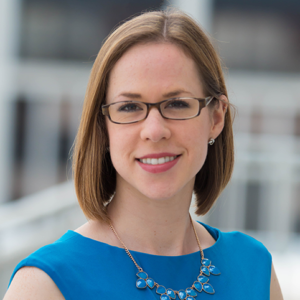


Elizabeth comes to the USGLC from the Council of Better Business Bureaus, where she managed BBB’s national digital media platforms, and previously, its relations with over 200 Fortune 500 and nonprofit members. An award-winning writer, Elizabeth has also worked for Public Affairs at the U.S. Military Academy at West Point, managed communications at New York State’s oldest estate vineyard, and gained a diverse range of experience at DoD, multinational corporations, and nonprofits. She holds an M.S. in Public Relations from Syracuse University’s S.I. Newhouse School and a B.A. in English and Spanish from the State University of New York at Fredonia, and also studied at Northumbria University in England. Elizabeth, a Montana native, serves on the Northern Virginia board of the Royal Scottish Country Dance Society.
The International Labor Organization estimates that nearly 21 million people are victims of forced labor, human trafficking, and sexual exploitation— more than at any other time in history. One in five of those victims are the most vulnerable among us: boys and girls, separated from their families and forced into prostitution, or labor. But the U.S. government and organizations like ChildFund are taking steps to end human trafficking.
Secretary James “Mad Dog” Mattis doesn’t mind taking a moment to share his thoughts about the importance of diplomacy and development, as one intrepid high school student discovered when Secretary Mattis returned his call.
Many U.S. Agency for International Development (USAID) programs don’t often make headlines — for good reason. Just as we don’t hear about the wars that were prevented, we don’t read about the diseases that were stopped before they became the next Ebola, bird flu, or Zika — debilitating, fatal pandemics that caused severe burdens on livelihoods and economies and posed threats to global security and stability. The USAID-funded Preparedness and Response project, or P&R, is active in 16 countries, including Uganda, to establish the coordination required across many sectors to prevent, detect, and respond to emerging diseases and other international threats like antimicrobial resistance.
Today, TB is still one of the world’s deadliest diseases. 10.4 million people (that’s more than the combined populations of Mississippi, Colorado, and New Mexico) became sick with it in 2015, resulting in nearly 2 million TB-related deaths around the world. But here’s the good news: TB is both curable and preventable. Even better: the U.S., along with many partner organizations, is making progress towards ending TB once and for all.
Women account for half the world’s population, but are disproportionally affected by extreme poverty. However, nearly one billion women are poised to enter the global economy over the next decade. March 8, International Women’s Day, is an opportunity for us to consider how reaching women with vital programs to support everything from girls’ education to workforce participation affects lives, communities, and nations, including the U.S.
Food consumers across the world—from North Carolina to Nairobi, from Kiev to Kathmandu—are expected to number 9 billion in 2050. And right now, around 795 million don’t have enough food to lead healthy, active lives. To feed this future, there’s an urgent need to find new, long-term solutions. Fortunately, a good idea can come from anywhere. That’s one of the driving concepts behind a unique partnership between Land O’Lakes International Development and the U.S. Agency for International Development.
Even modest investments in helping ensure children attend, remain, and learn in school leads to a greater and better-educated workforce— which in turn improves local, regional, and national economies. And in Ethiopia, USAID investments have helped achieve 95 percent enrollment in primary school over just the past 15 years. What’s behind these numbers? Investing in those who teach. One USAID program is designed to reach remote areas of Ethiopia, providing schooling in off-the-beaten-path areas that had never had access to basic education, where the nearest government school is two hours away on foot.
This week, a bipartisan group of former U.S. senators came together in support of America’s international affairs funding, urging the leaders of the Senate Appropriations Committee and the State-Foreign Operations Subcommittee to maintain America’s role in the world.
World Vision, an international faith-based humanitarian organization, has been building on its initial success with USAID-funded water programs in Ghana in the 1980s. These projects now form the model for its newest partnership with Kohler, which focuses on the development of a ceramic filtration system that can be worn on the back for easy carrying, and doesn’t need electricity, since it works solely based on gravity.
Congress is often accused of becoming more and more divided, and that partisanship is worse than ever (check out Brookings’ interactive graphic of Members’ historical voting patterns). However, the International Affairs Budget — and U.S. global development programs — continue to enjoy broad support from both sides of the aisle. As the FY2017 federal budget process moves forward, we’ve been tracking what’s being said in the House and Senate hearings about the future of our nation’s international affairs programs.
Get the latest news, advocacy, and event updates from the USGLC
Copyright 2025 USGLC | Privacy Policy
Notifications